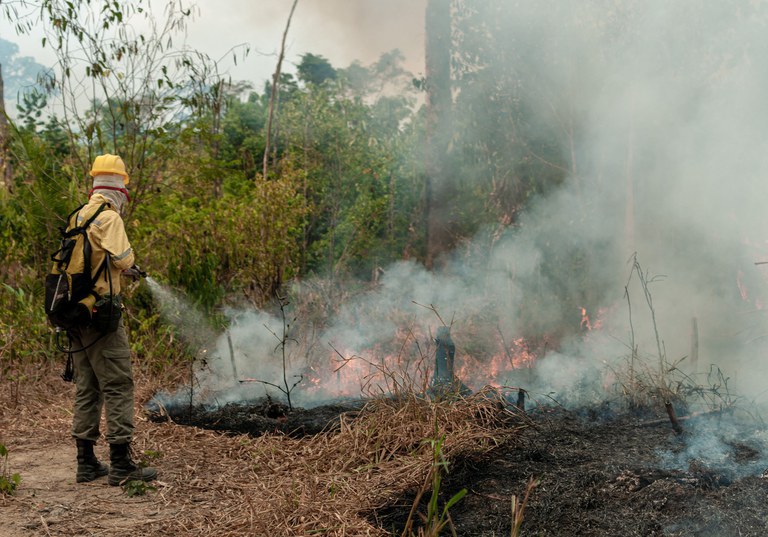Notícias
WILDFIRE COMBAT
Brazil's Federal Government deploys over 1,400 personnel to fight Amazon forest fires

Prevfogo/Ibama fire brigade members participate in joint operation against Amazon wildfires. Image: Vinícius Mendonça/Ibama
The Brazilian Federal Government is working with 1,489 firefighters from the Brazilian Institute of the Environment and Renewable Natural Resources [Instituto Brasileiro do Meio Ambiente e dos Recursos Naturais Renováveis/IBAMA] and the Chico Mendes Institute for Biodiversity Conservation [Instituto Chico Mendes de Conservação da Biodiversidade/ICMBio] to combat forest fires in the Amazon. Climate change has brought the wildfire season to the region prematurely and intensified it, similar to what occurred in Pantanal
Since mid-2023, the Amazon has been facing one of the worst droughts in history, with forest fires in Brazil, Peru, Bolivia and other regional countries.
Of the 173 wildfires registered in the North of Brazil since July 24, 98 have been extinguished or brought under control. Each wildfire can spread as dozens, hundreds or even thousands of hotspots.
This Amazon Basin drought has been the worst in at least two decades. In July, the National Water and Sanitation Agency [Agência Nacional de Águas e Saneamento Básico/ANA] declared a critical water scarcity situation along the Madeira and Purus rivers.
According to an international study released this week, the climate emergency increased by up to 20 times the chance of recurrence of climate conditions that intensified wildfires in the Western Amazon from March 2023 to February 2024.
Forest wildfires in that biome have been linked to the clearcutting of forests to be used as pastures. With the resumption of environmental governance under the current administration, the area under deforestation alerts in the Amazon dropped 45.7% from August 2023 to July 2024, compared to the previous 12 months, according to data from the Deter system, compiled by the National Institute for Space Research [Instituto Nacional de Pesquisas Espaciais/INPE]. The area under alerts (4,315 km²) represents the lowest mark in the historical series that began in 2016.
The results from the Deter system indicate the trend in the annual deforestation rate, always measured from August to July by another Inpe system called Prodes. From August 2022 to July 2023, deforestation had already dropped by 22.3% according to Prodes. Without the accumulated reduction in deforestation, projections indicate that the region would be even more vulnerable to fire.
Currently, wildfires in the Amazon occur mainly in the south of Amazonas and around the Trans-Amazonian Highway (BR-230). Amazonas and Pará together account for more than half (51.6%) of the wildfires in the biome from January 1 to August 18, 2024, according to data from Inpe. Since July 1, 67.2% of the recorded wildfires have occurred in the two states.
IBAMA and ICMBio firefighters work primarily in federal areas, such as settlements, Indigenous Lands, and Conservation Units. They also support firefighting in other areas, where action is the priority responsibility of the states. The federal response to the drought and wildfires in Brazil is coordinated by a situation room created by the Federal Government in June. At the last meeting, held on Friday (16/8), the group discussed new measures to combat wildfires in the Amazon and the Pantanal. The room was chaired by the executive secretary of the Chief of Staff’s Office, Miriam Belchior, and was attended by Minister Marina Silva, Ministers Waldez Góes [Infrastructure and Regional Development/Infraestrutura e Desenvolvimento Regional/MIDR] and Paulo Teixeira [Agrarian Development/Ministério do Desenvolvimento Agrário/MDA] and representatives of other agencies.
The Federal Government coordinates the response to the wildfires with state governments and representatives of the Fire Departments of the North region. BRL 405 million was made available from the Amazon Fund to support the Fire Departments of the nine states of the Legal Amazon, among other measures. In April, the Federal Government launched the Union with Municipalities program, which will allocate BRL 785 million to actions to combat deforestation and forest wildfires in the 70 priority municipalities in the Amazon. The funds will be sent if there is a drop in deforestation in the municipalities.
State representatives and fire departments were invited to participate in meetings of the Integrated Multi-Agency Center for Federal Operational Coordination [Centro Integrado Multiagências de Coordenação Operacional Nacional/Ciman], a federal collegiate body that coordinates operational actions to combat wildfires across all biomes. For the first time since its creation, the group was mobilized in the first half of the year due to the two-month advance of the fire season in the Pantanal.
In July, President Lula signed a bill that regulates integrated wildfire management in Brazil to prevent and combat forest fires. The text prohibits the use of fire for deforestation or suppression of native vegetation, except when there is controlled burning of vegetation residue. For agricultural practices, this will be permitted only in specific situations, and landowners can be held responsible in the event of fires.
The policy will be implemented in cooperation between the federal government, states, municipalities, civil society and private entities. Governance will be carried out by an advisory and deliberative National Committee for Integrated Fire Management [Comitê Nacional de Manejo Integrado do Fogo/CNMIF], which will have the participation of representatives from various sectors, ensuring coordination between public and private institutions and civil society.
The new policy is expected to encourage the creation, training and strengthening of volunteer and private brigades, in addition to the staff of fire departments and federal, state and municipal brigades. The MMA will organize a national registry of forest brigades.
In June, on World Environment Day, President Lula signed a pact with the governors of the Amazon and Pantanal to prevent and control fires. Among other points, the initiative seeks to strengthen coordinated action to prevent, control and manage fires. It also determines the suspension of burning authorizations until the end of the dry season and during periods with predicted heat waves.
MMA Press Office
imprensa@mma.gov.br
(+5561) 2028-1227/1051